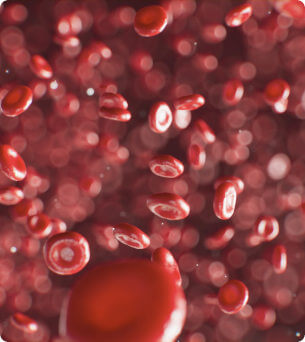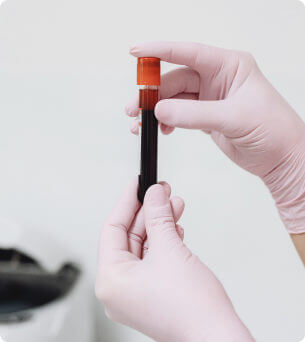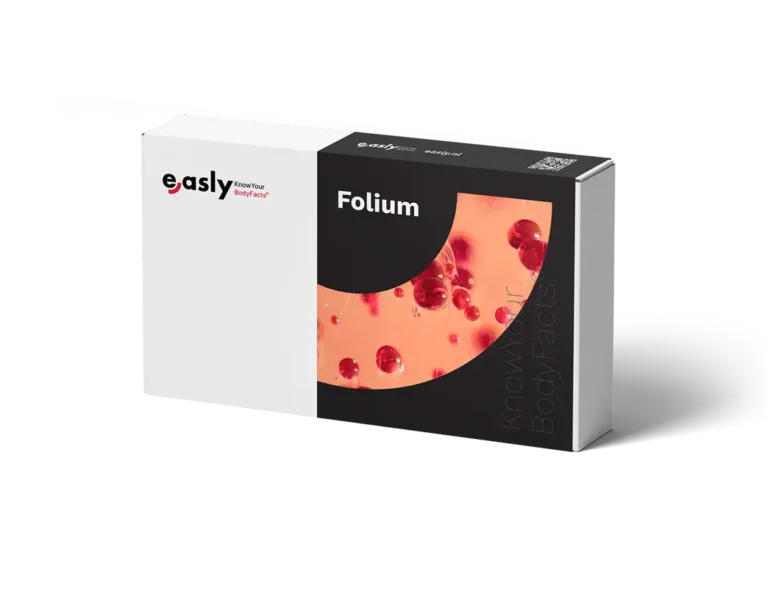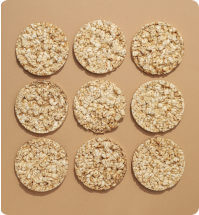The iron in our blood is essential for life. It is worrying, then, that according to recent research from Radboud University, as many as 1.2 billion people worldwide suffer from an iron deficiency in their bodies. What are the symptoms of a low iron level? What causes iron deficiency? And how can you solve a low iron saturation? Easly tells you everything about the world of iron.


What does iron do in your blood?
Iron is an element that we all know. The physical world is full of it. However, iron also has an important function in your body. Iron is needed to produce sufficient hemoglobin (Hb) in the blood. And hemoglobin binds oxygen and thus facilitates the transport of oxygen and its absorption into the cells in your body. Without iron, your cells lack their fuel. So iron is essential for our existence.
What healthy iron values are, differs for men and women. In men, an iron value between 14 and 35 micromoles per liter of blood is considered normal. The normal values for women are slightly lower: between 10 and 25 micromoles of iron per liter of blood.

(Chronic) iron deficiency
The iron content in the blood is indirectly determined by measuring the amount of ferritin – a protein that stores iron in the body. If there is too little ferritin, there is not enough iron in your blood. You then score lower than the previously mentioned normal values. In that case, we speak of an iron deficiency. An occasional deficiency does not necessarily cause complaints. That is different when the iron deficiency causes anemia. This can cause quite a bit of discomfort. For some people, iron deficiency is chronic. There is then structurally too little iron in the blood. In consultation with a doctor, something must of course be done about this.

Incidentally, an excess of ferritin – an accumulation of ferritin in the blood – is not healthy either. A too high ferritin does not necessarily mean that you also have too much iron. An excess of ferritin can be caused by various reasons. For example, there may be a temporary excess of ferritin during an inflammation. But also liver diseases, autoimmune diseases and being overweight can increase ferritin levels. In cases of hereditary hemochromatosis (also called hereditary iron overload disease), the body does absorb too much iron. This can sometimes lead to complaints.
Iron deficiency symptoms
Iron deficiency often goes unnoticed until it leads to anemia, a condition where low hemoglobin levels reduce oxygen transport in the blood. Symptoms can range from mild to severe, depending on how depleted iron stores are.
Common symptoms of iron deficiency anemia
- Fatigue & Weakness – The most common symptom, persistent exhaustion, occurs because low hemoglobin limits oxygen supply to muscles and organs, making even daily activities feel draining.
- Pale Skin & Mucous Membranes – Since hemoglobin gives blood its red color, low levels can make the skin, lips, gums, and eyelids appear pale.
- Shortness of Breath & Dizziness – Oxygen deficiency can make breathing feel difficult, particularly during physical activity, while reduced oxygen flow to the brain can cause dizziness or lightheadedness.
- Headaches – Low iron may reduce oxygen supply to the brain, triggering frequent headaches or migraines.




- Heart Palpitations – In severe cases, the heart works harder to circulate oxygen-poor blood, which may cause a racing heartbeat, irregular beats, or a pounding sensation in the chest.
- Restless Legs Syndrome – Many iron-deficient individuals experience an uncomfortable urge to move their legs, especially at night, leading to sleep disturbances.
- Hair, Skin, and Nail Changes – Iron supports healthy cell growth. Deficiency can lead to brittle nails, dry or thinning hair, and cracked skin around the mouth.
- Increased Susceptibility to Infections – Iron plays a key role in immune function. A deficiency weakens the body’s ability to fight infections, making illnesses more frequent.
Iron deficiency and weight gain
Low iron can lead to weight gain by reducing energy levels and slowing metabolism. When iron is low, the body struggles to produce enough energy, causing fatigue and less physical activity. Iron also supports thyroid function, which regulates metabolism. A deficiency can slow this process, making weight gain more likely. Restoring iron through diet or supplements can support a healthy metabolism.
Why testing is essential
Since iron deficiency symptoms can overlap with other conditions, self-diagnosing isn’t reliable. The only way to confirm low iron levels is through a blood test that measures iron saturation, hemoglobin, and ferritin levels. If you’re unsure about your symptoms, a comprehensive test like the Essential 7 test allows you to assess key blood markers without a GP referral. However, test results should constantly be reviewed by a doctor to determine the best course of action.
Related tests




De oorzaken van ijzertekort
Iron deficiency can have various causes. Eating too little iron-rich food can, for example, cause a deficiency. There are also differences between men and women. In women, iron deficiency can be the result of excessive blood loss during menstruation. In men, and in women who no longer menstruate, iron deficiency can be caused by chronic blood loss in the gastrointestinal tract.

How do you get rid of an iron deficiency?
The consequences of iron deficiency can be potentially significant, depending on how large the deficiency is and how long it lasts. But it is also possible that no complaints occur. As mentioned, iron deficiency can cause anemia. Anemia is a shortage of hemoglobin (Hb) – the protein in red blood cells that binds oxygen and is responsible for the oxygen transport in your blood. Anemia and iron deficiency are therefore not the same. For example, it is possible that you have too little iron in your blood, but that the Hb value is normal.
Incidentally, not all forms of anemia are caused by an iron deficiency. A lack of folic acid or vitamin B12 can also cause anemia. In addition, there are hereditary or chronic diseases that can cause anemia. Think, for example, of thalassemia, cancer, kidney diseases, and rheumatism. Want to know more about a hemoglobin deficiency? Read our blog about hemoglobin!


Supplementing iron deficiencies
Have you, for example through a self-test, determined that there is not enough iron in your blood? In that case, it is advisable to supplement the iron deficiency. This can be done in various ways. For example, you can change your diet and eat more iron-rich foods. Foods that contain a lot of iron are: whole grain gingerbread, whole grain spaghetti, rye bread, meat and whole grain crackers. The Voedingscentrum site can tell you more about this. In addition, it is possible to artificially supplement the iron content in your blood with iron supplements.
Note: for serious (very clear) symptoms and complaints, it remains important to first talk to your GP.



Finally, an iron deficiency is common. The consequences do not always have to be serious, but in some cases, they can be, for example when the iron deficiency disrupts the production of hemoglobin and this leads to anemia. So keep an eye on the iron content in your blood. Nowadays, this can be done with a simple iron deficiency self-test, which you can do at home without involving your GP. With early preventive testing, you can prevent many medical problems. Because the cliche is still true: measuring is knowing.







